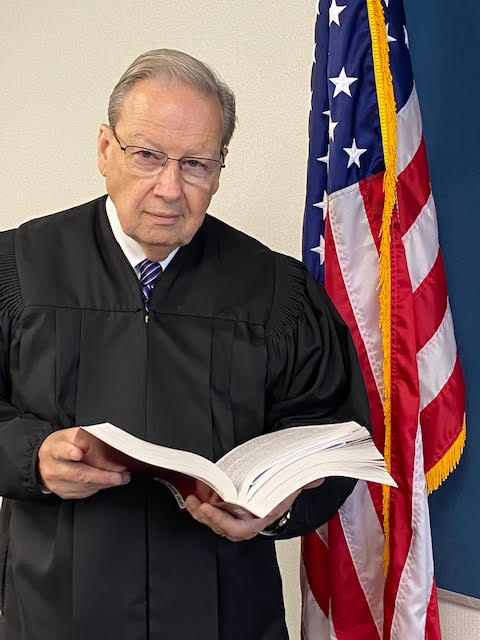Most people don’t have a clue what a county judge does on a day-to-day basis, but the current Taylor County Judge, Downing A. Bolls Jr., will tell you that there are no “typical” days.
Each day brings something different, whether on the judicial side of the job or the administrative side. As of Dec. 31, Bolls will retire, keeping a promise he made when first elected as Taylor County Judge in 2010.That promise was a self-imposed three-term limit in office, so after 12 years as county judge, Bolls is retiring at the end of the year.
 A history buff, Bolls will go out chosen as the 2022 Perini Award winner by the Taylor County Historical Commission. The award, named in honor of the first honoree, the late Maxine Perini, “recognizes outstanding service to Taylor County in the preservation of its history and the promotion of historical events.” It’s only natural that Bolls will pursue that interest once he’s retired.
A history buff, Bolls will go out chosen as the 2022 Perini Award winner by the Taylor County Historical Commission. The award, named in honor of the first honoree, the late Maxine Perini, “recognizes outstanding service to Taylor County in the preservation of its history and the promotion of historical events.” It’s only natural that Bolls will pursue that interest once he’s retired.
“I am going to continue my love of history and writing about history,” he said.
A native of Biloxi, Mississippi, Bolls was a military brat, which gave him the opportunity to live in many historic places like Washington, D.C., Montgomery, Alabama, and Vicksburg, Mississippi.
His dad, Downing A. Bolls Sr., was stationed at Camp Barkeley, southwest of Abilene, during World War II and transferred to the Air Force when it broke off from the Army Air Corps in 1947. He retired as a lieutenant colonel at Dyess AFB, where he was stationed from 1967 to 1971.
Just like his dad, Downing Bolls Jr. has a military background. After graduating high school in 1968, he enlisted in the Marine Corps and served as a security guard in U.S. Embassies in Saigon and Guatemala City. He earned a degree in journalism from Southwest Texas State University (now Texas State University) and later earned a master’s degree in conflict resolution from Abilene Christian University.
Bolls worked in radio and television for 33 years before running for Taylor County Judge in 2010. His jobs are varied, but one of his favorites is overseeing the restoration of the 1915 Taylor County Courthouse.
“The joy for me has been discovering the history from people who have memories of that courthouse,” he said.
Besides delving more into history after retirement, Bolls plans to join his wife, Deborah, in antiquing projects, and visiting family. He and Deborah have two children, Clark, who lives in Abilene, and Glenys, who lives in Lubbock with her family, including two granddaughters ages 9 and 5.
WHAT MAKES ABILENE UNIQUE?
I believe what makes Abilene unique is its sense of self-worth and its determination to get there as a community. From the beginning, Abilene was a town with a purpose. Abilene has always been on the road to something bigger and better. It was settled by people seeking opportunity and a desire to grow. That spirit is what attracted people of a like mindset some of whom had already come
to Taylor County in search of the same thing. It was that desire that prompted the community to become an organized city, then the county seat, then a regional center for commerce, government, education, and medicine.
Abilene has that hunger for moving forward, but it hasn’t lost its ability to remember the importance of the “individual.” Quality of life issues are important, but so is the continuing desire to be bigger and better. Abilene embraces its history, but isn’t afraid to look at itself in the mirror from time to time to make sure it’s still on the road it has charted for itself.
WHAT IS ONE OF THE BIGGEST CHALLENGES THAT ABILENE IS FACING?
Abilene’s place as a regional “hub” is by choice; not chance. That vision lives on today, but I think sometimes it gets a little ahead of itself. The biggest challenges are infrastructure and erosion of its talent pool. The world we live in today has been made much smaller by technology and we are losing a lot of our younger folks to the lure of the larger cities. One of the biggest challenges is making this a place young families want to stay – not just come back to. Because of the urban drift going on, Taylor County will be seeing some of the same infrastructure issues: roads, public safety, and desire for services.
WHAT DOES A DAY IN THE LIFE OF A COUNTY JUDGE LOOK LIKE?
You know, it can be a little scary sometimes; humorous and heart-rending at other times, but always a surprise. There is no such thing as a typical day for a county judge, but I can say that the job is what you make it. There is the legal role to fulfill as a judge, but lots of other administrative roles as the guy who signs everything. Judicially, I do uncontested probates, guardianships, and mental commitments. All three can have a significant impact on people who are dealing with the related issues.
Each day starts with a prayer for courage, wisdom and compassion in the cases that will come before me. The other part of the job is more administrative. Ever mindful of the budgetary constraints, sometimes you have to be the voice of restraint and other times a voice of reason. You must be resilient and a good listener.
WHAT PROMPTED YOU TO RUN FOR COUNTY JUDGE THE FIRST TIME?
I had just ended a 33-year career in radio and television, and while looking for a new job, someone called me and asked me if I had ever thought about being a county judge. They felt I had the qualifications and maturity for the job and it would be an opportunity to use my conflict resolution skills. The biggest reason though was after three decades of reporting on tragic events, I felt a need to want to do something positive. I had never sought elected office or public service, but I thought about it, talked to some former associates and my spouse, and all were supportive of the idea and urged me to go for it. It had a significant learning curve.
YOU WERE HONORED AS THE 2022 RECIPIENT OF THE PERINI AWARD GIVEN BY THE TAYLOR COUNTY HISTORICAL COMMISSION. WHERE DOES YOUR INTEREST IN HISTORY COME FROM? A TEACHER? PARENTS?
Actually, all of the above. My life as a military brat took me to many historical places (i.e. Washington, D.C.; Montgomery, Alabama; Vicksburg, Mississippi). I was raised on stories of the Civil War by aunts, uncles, and grandparents. I was in D.C. when President Kennedy was assassinated and Dr. Martin Luther King made his “I Have a Dream” speech. I was in Montgomery when Rosa Parks got removed from the bus (although I was just a child at the time).
I had great teachers who took their classes on field trips, and nurtured a natural curiosity about “why”? I have a quotation on my computer, “If you want the present to be different from the past, study the past.” I love the County Historical Commission because its members all share the same love for history and the search for “truth.”
WITH YOUR INTEREST IN HISTORY, RESTORATION OF THE 1915 TAYLOR COUNTY COURTHOUSE MUST BE EXCITING TO YOU. WHAT HAVE BEEN SOME SURPRISES UNCOVERED DURING THE RESTORATION WORK?
First, let me say that being in that old courthouse is like taking a step back in time. The joy for me has been discovering the history from people who have memories of that courthouse. People who tell you interesting things that nobody really knows about it. For example, it was home to the Taylor County Red Cross, which was organized in 1916, with a first class dispensary and Child Health Center. Its approach to medicine was “preventive rather than curative.”
I enjoy the stories from the attorneys who practiced law there. The building itself has given up some secrets. We have found some unusual things in the walls during demolition: a child’s toy, a tube of women’s lipstick, WPA work permits from the Depression, a 1903 cornerstone. Best estimates are that the renovation will be finished by 2025.
DO YOU HAVE ANY FUN AND INTERESTING RETIREMENT PROJECTS LINED UP?
I am going to continue my love of history and writing about history. I will probably spend time with the wife antiquing and enjoying the freedoms which most private citizens enjoy, but which I have been unable to participate in due to judicial constraints. I also plan to spend a lot more time with the granddaughters.
Downing’s Favorites
DRINKS: Ice cold water or cold tomato juice (in the morning)
CURRENTLY READING: Big Wonderful Thing: A History of Texas by Stephen Harrigan; Thinking in Time: The Uses of History on Decision Makers by Richard E. Neustadt and Ernest R. May
By Loretta Fulton























Leave a Reply